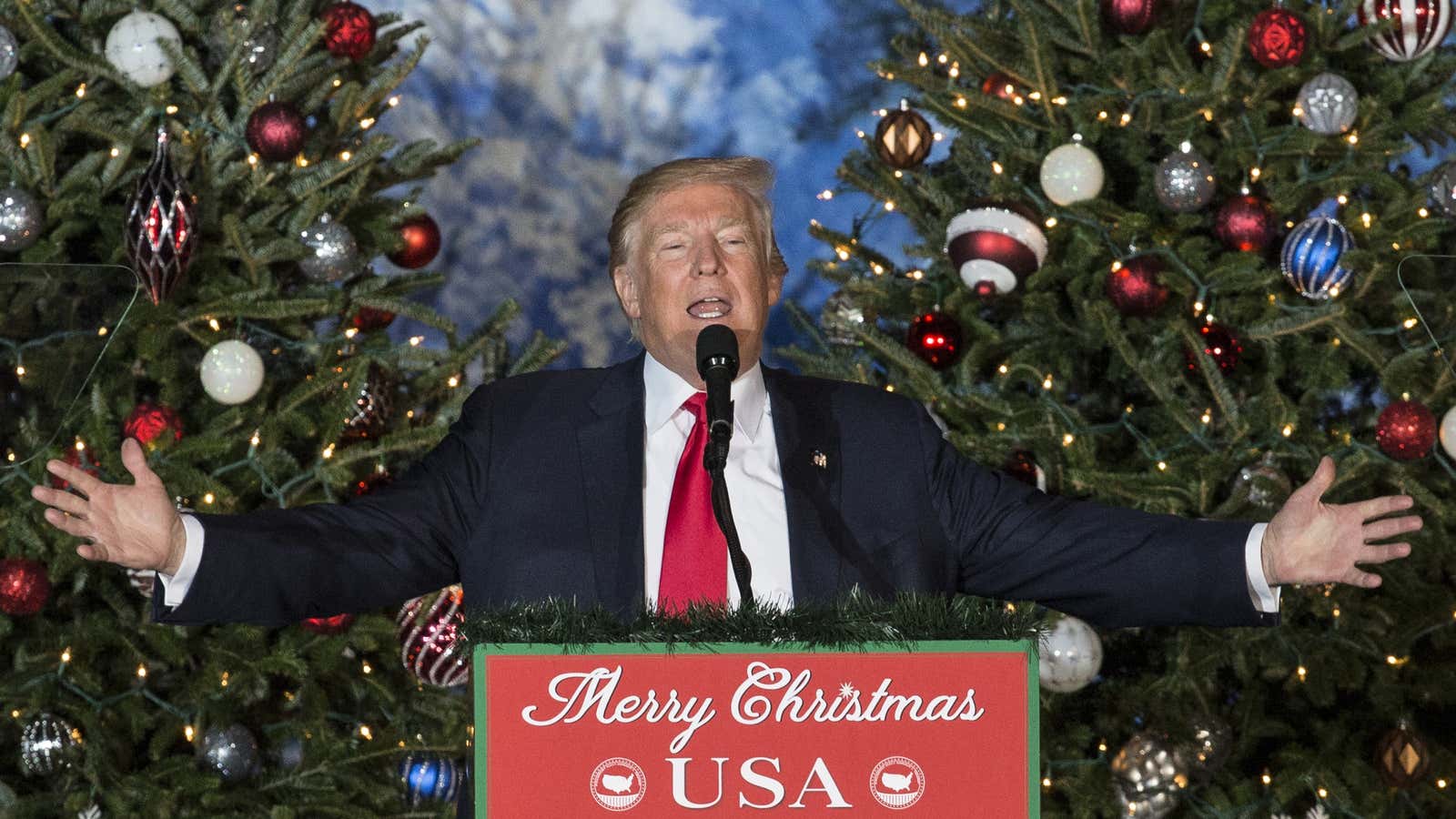On Monday, Dec. 19, the members of the Electoral College, the group of voters from each state that elect the US president and vice-president, will meet in their respective state capitals to cast their votes. By the current tally, Donald Trump should beat Hillary Clinton 306 – 232 to become the 45th president of the United States.
Usually, the vote is a mere formality. The electors that make up the college cast their votes based on the popular vote winner of their state, and the result becomes official. Although there have been a few electoral college voters who cast their ballot for someone other than the winner of their state—referred to as faithless electors—none has ever affected the outcome of an election. But this Monday, there is a very small, but technically possible, chance that faithless electors could hand the presidency to Hillary Clinton, or someone else entirely.
There is a group of Electoral College voters, referring to themselves as the Hamilton Electors (named after Alexander Hamilton, an original proponent of the Electoral College as a check on who was being elected), that are hoping to stop Trump from being elected.
The movement is led by two Democratic electors (although their site says they are led by “several members” of the Electoral College) that are hoping to convince 37 electors to change their vote from Trump. Trump currently has 306 votes, meaning a swing of 37 would leave him one vote short of the 270 votes required to win the presidency. Lawrence Lessig, a Harvard Law professor who is advising electors on their legal rights, says he is confident at least 20 Republican electors are considering changing their votes, though he says others have told him the number could be more like 30.
Meanwhile, 55 electors have asked that James Clapper, the US director of national intelligence, to brief them on Russia’s involvement in the presidential election, and any connection the Trump team has to the Kremlin. Unfortunately for the Hamilton Electors, however, only one of 55 was a Republican voter. Yesterday, word came down that the electors won’t get that intelligence briefing after all. And an Associated Press survey of 330 electors earlier this week suggests that, “Republican electors appear to be in no mood for an insurrection in the presidential campaign’s last voting ritual.”
But what would happen if 270 electors didn’t vote for Trump depends on who they did vote for. As unlikely as this whole scenario already is, it’s positively laughable that 38 Republican electors would vote for Hillary Clinton to win the presidency. (She’d need one additional elector beyond the 37 to avoid a 269 – 269 tie.) If no candidate wins an outright majority, the House of Representatives would decide who the next president is, with each state delegation getting one vote.(The Senate would then elect the vice president, if there is also a tie in that race, with each senator casting one vote.)
It would be an unprecedented break with voters for the Republican-controlled chamber of Congress not to simply vote Donald Trump into office at that point. But if the decision actually landed in the House, than clearly something unprecedented (unpresidented?) has already happened.
So even if things get very interesting on Monday, in all likelihood, it’s still Donald Trump who is sworn in as president on Jan. 20, 2017.
But there is still time for Donald Trump to put his foot in his mouth between now and Monday. His political opponents are hoping and wondering whether there is anything that would disqualify him in the eyes of at least 37 electors, beyond what they already consider to be disqualifying, including his many conflicts of interest and his bragging about sexual assault. Those traits have been joined by his flip tweets, which now move markets, and his freelancing on foreign diplomacy, which has seemed to catch the ire of president Obama.
Earlier today, Dec.17, the president-elect tweeted his reaction to the Chinese capture of a US oceanographic drone yesterday that was conducting tests 50 miles off the shore of the Philippines:
There’s a small irony in spelling “unprecedented” as the non-existent word “unpresidented” just two days before being formally elected as the next US president.
Trump did eventually correct the spelling by deleting the original tweet (without acknowledging his mistake). In the last few weeks, Trump has twice angered China. First, he accepted a phone call from Taiwan’s president, Tsai Ing-wen, which likely angered China, as it believes the country to be a renegade Chinese province rather than an independent state. He then followed up the call by questioning the long standing “One China” diplomatic policy of treating Taiwan and China as the same country on Fox News and a series of tweets.
There are still roughly 36 hours until the Electoral College meets, so it’s entirely possible—if extremely unlikely—that Trump could do, say, or tweet any number of things that might cause 37 electors to have second thoughts about casting their votes for him.
